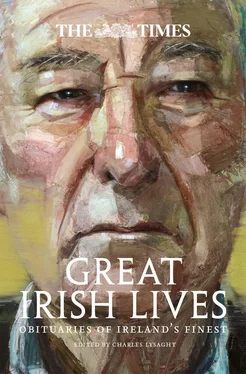1 ...6 7 8 10 11 12 ...21 * * *
MARIA EDGEWORTH
28 MAY 1849
OF MARIA EDGEWORTH it may be said – even more emphatically than of her sister-novelist, Miss Burney – that she lived to become a classic. Her decease in her 83rd or 84th year can hardly be felt as a shock in the world of letters though it bereaves her home-circle of one whose many days were but so many graces – so actively unimpaired did her powers of giving and of receiving pleasure and instruction remain till a very late period of her existence. The story of Miss Edgeworth’s life was some years since told by herself in her memoir of her father. She was born in England – the daughter of Mr Richard Lovell Edgeworth, by the first of that gentleman’s four wives – and had reached the age of 13 ere she became an Irish resident. Fifty years or more have elapsed since her Castle Rackrent – the precursor of a copious series of tales, national, moral, and fashionable (never romantic) – at once established her in the first class of novelists, as a shrewd observer of manners, a warm-hearted gatherer of national humours, and a resolute upholder of good morals in fiction. Before her Irish stories appeared, nothing of their kind – so complete, so relishing, so familiar yet never vulgar, so humorous yet not without pathos – had been tendered to the public. Their effect was great not merely on the world of readers, but on the world of writers and politicians also. Sir Walter Scott assures us that when he began his Scottish novels it was with the thought of emulating Miss Edgeworth; while Mr O’Connell at a later period (if we are to credit Mr O’Neill Daunt) expressed substantial dissatisfaction because one having so much influence had not served her country as he thought poor Ireland could alone be served – by agitation. Prudence will allay, rarely raise, storms; and Prudence was ever at hand when Maria Edgeworth (to use Scott’s phrase) “pulled out the conjuring wand with which she worked so many marvels.” Herein lay her strength and herein also some argument for cavil and reservation on the part of those who love nothing which is not romantic. “Her extraordinary merit,” happily says Sir James Mackintosh, “both as a moralist and as a woman of genius, consists in her having selected a class of virtues far more difficult to treat as the subject of fiction than others, and which had therefore been left by former writers to her.”
To offer a complete list of Miss Edgeworth’s fictions – closed, in 1834, by her charming and carefully wrought Helen – would be superfluous; but we may single out as three masterpieces, evincing the great variety of her powers, Vivian , Tomorrow , and The Absentee . Generally, Miss Edgeworth was happier in the short than in the long story. She managed satire with a delicate and firm hand, as her Modern Griselda attests. She was reserved rather than exuberant in her pathos. She could give her characters play and brilliancy when these were demanded as in “Lady Delacour;” she could work out the rise, progress, and consequences of a foible (as in Almeria ) with unflinching consistency. Her dialogue is excellent; her style is in places too solicitously laboured, but it is always characteristic, yielding specimens of that pure and terse language which so many contemporary novelists seem to avoid on the maidservant’s idea that “plain English” is ungenteel. Her tales are singularly rich in allusion and anecdote. In short, they indicate intellectual mastery and cultivation of no common order. Miss Edgeworth has herself confessed the care with which they were wrought. They owed much to her father’s supervision; but this we are assured by her, was confined to the pruning of redundancies. In connexion with Mr Edgeworth the Essay on Irish Bulls was written; also the treatise on Practical Education … This brings us to speak of that large and important section of Maria Edgeworth’s writings – her stories for children. Here as elsewhere, she was “nothing if not prudential;” and yet who has ever suceeeded in captivating the fancy and attention of the young as her Rosamonds and Lucys have done? In her hands the smallest incident rivetted the eye and heart, – the driest truth gained a certain grace and freshness …
If Miss Edgeworth’s long literary life was usefully employed, so also were her claims and services adequately acknowledged during her lifetime. Her friendships were many; her place in the world of English and Irish society was distinguished. Byron (little given to commending the women whom he did not make love to, or who did not make love to him) approved her. Scott, addressed her like an old friend and a sister. There is hardly a tourist of worth or note who has visited Ireland for the last 50 years without bearing testimony to her value and vivacity as one of a large and united home circle. She was small in stature, lively of address, and diffuse as a letter-writer. To sum up it may be said that the changes and developments which have convulsed the world of imagination since Miss Edgeworth’s career of authorship began have not shaken her from her pedestal nor blotted out her name from the honourable place which it must always keep in the records of European fiction.
TOM MOORE
1 MARCH 1852
THE ELEGY OF TOM MOORE should not contain one mournful or distressing note! Flourishing in an age of poets – of men who have stamped their characters upon the literature of their country and earned undying fame – he takes his ground as fairly as the best of them. Within his sphere he is unapproachable. He has little in common with the stormy passion of Byron; the philosophical grandeur of Coleridge is unknown to him; the muse of Scott and his own are scarcely kindred cousins; his productions have as little of the dreamy and mystical splendour of Shelley as they are allied to the elaborate and fatiguing epics of Southey; but within the circle of his own uncontested dominion he has poured forth strains as exquisite as any fancy ever clothed in sparkling verse to delight the jocund heart of man. The mind of Moore, from the moment that he took pen in hand, may be said to have been always in a state of pleasure. He has written satires as well as songs, and dealt with themes both sacred and profane: he has described the loves of angels and the holy piety of erring mortals; but, whatever the employment, one condition of feeling is always manifest. Most musical, most happy was his genius, and music and joyousness are careering in almost every syllable that he spoke …
Thomas Moore was born in Dublin on the 30th of May, 1780, the son of a small tradesman, who afterwards became a quartermaster in the army. It is not easy to decide when he first attempted verse. Upon looking back he could not discover when he was not a scribbler. In his thirteenth year he was already a contributor to a magazine; in his fourteenth he had addressed a sonnet to his school-master; and some three years before he sent his productions to the Irish periodical he had distinguished himself in another branch of art by undertaking principal characters in amateur theatricals. Moore was privileged to be precocious without paying the penalty of precocity. When he was 12 years old he accompanied his father, a Roman Catholic, to a patriotic dinner held in honour of the French Revolution, then a recent event, and regarded, as he himself tells us, as a signal to the slave, wherever suffering, that “the day of his deliverance was near at hand.” Men’s hearts, it has been written, are cradled into poetry by wrong. The early genius of Moore was, no doubt, nurtured by the sufferings of his race, and maintained in vigour and freshness until the decaying music of his native land came to claim him wholly as her own. The act of Parliament having opened the University to Roman Catholics in 1793, the young poet immediately availed himself of his opportunity. The year following his admission, while still a child, he wrote and published a paraphrase of Anacreon’s fifth ode, and then proceeded to the translation of other odes by the same poet, for which he vainly hoped the university board might deem him “deserving of some honour or reward.” Disappointed in his expectation he nevertheless continued his task, and occupied himself in improving his verses and illustrating them by learned annotations, until he reached his 19th year, when he quitted Ireland for the first time, and set out for London “with the two not very congenial objects of keeping his terms in the Middle Temple and publishing by subscription his translation of Anacreon .” The translation duly appeared in 1800. It was dedicated to George IV., then Prince of Wales, who, we may remark, received no further honour at the poet’s hands.
Читать дальше












